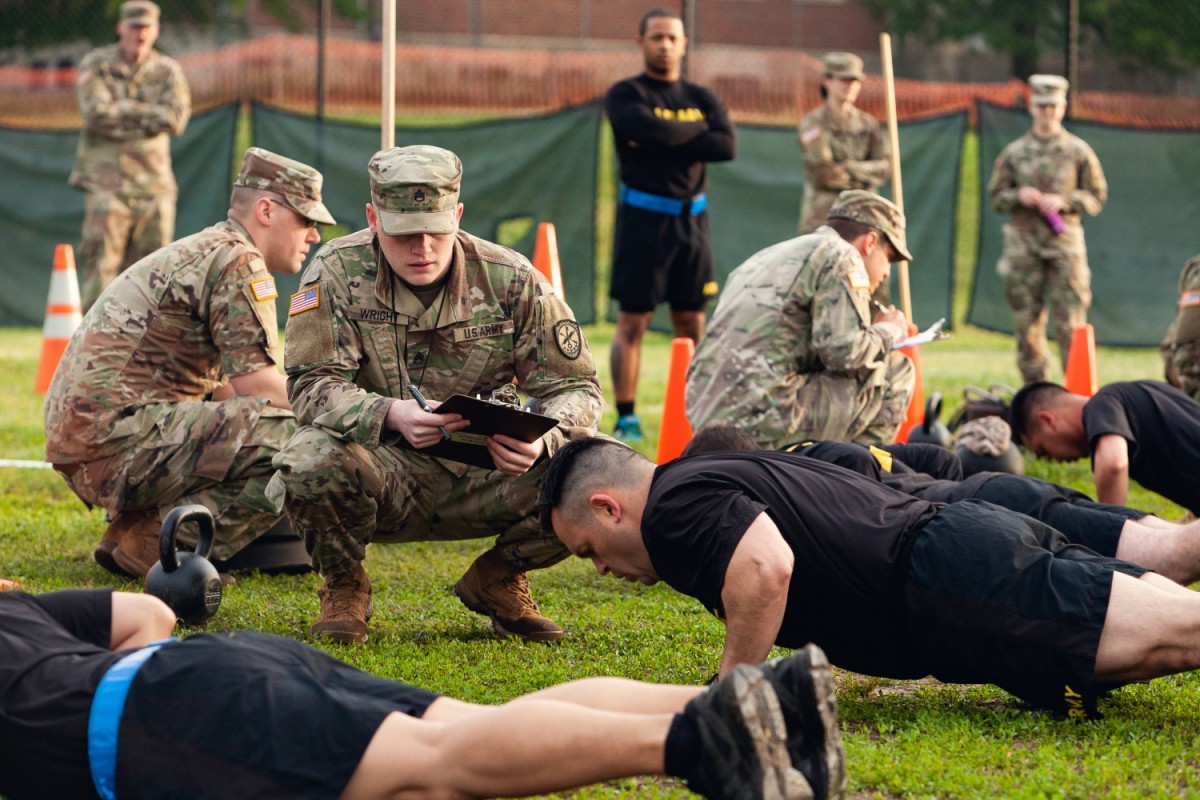
U.S. Army Staff Sgt. Gabriel Wright, a signals intelligence analyst with the 780th Military intelligence Brigade, grades the Hand-Release Push-Up event May 17, 2019, as part of Army Combat Fitness Test Level II Grader validation training, held at Fort Meade, Maryland. A mobile training team from Fort Gordon’s Cyber Center of Excellence NCO Academy in Georgia provided the training by teaching, coaching, and administering the ACFT to 114 NCOs. (U.S. Army Photo by Sgt. 1st Class Osvaldo Equite/Released) (Sgt. 1st Class Osvaldo Equite)
Secretary approves implementation of revised Army Combat Fitness Test
By Sgt. 1st Class Will Reinier March 23, 2022
WASHINGTON – Secretary of the Army Christine E. Wormuth issued an Army Directive today outlining a time-phased implementation of a revised ACFT as the Army’s general physical fitness test.
Changes made to the ACFT incorporate feedback from Soldiers and independent analysis of test performance.
Among the key changes announced by the Army are new age-and-gender-performance normed scoring scales; the replacement of the leg tuck with the plank for the core-strength assessment; and the addition of the 2.5-mile walk as an alternate aerobic event.
“The revisions to the ACFT are based on data and analysis, including an independent assessment required by Congress. We will continue to assess our implementation of the test to ensure it is fair and achieves our goal of strengthening the Army’s fitness culture."
A common concern identified by the Army’s independent analysis and the RAND study was that a gender-neutral test might not accurately measure all Soldiers’ general physical fitness levels. One example was using the leg tuck as the assessment of core strength.
RAND concluded that Soldiers might have the core strength that is not accurately measured if they lack the upper body strength required to perform a leg tuck. Now, the plank will be the sole exercise to assess core strength, using recognized standards from sister services as a baseline, and modifying the scales based on Army requirements.
The revised ACFT will utilize scoring scales that are age and gender normed, similar to the APFT. The Army designed the new scoring scales from nearly 630,000 ACFT performance scores, historical performance rates from the APFT, and scoring scales used by other military services.
The Army will continue to assess performance data and has established an ACFT governance body to provide oversight of the full implementation of the new test. This structure will assess ACFT scores, pass rates, injuries and environmental considerations, and report those findings along with any recommended changes to Army Senior Leaders. The first comprehensive assessment will be in April 2023.
Unlike the APFT, which went largely unchanged for 40 years, Army leaders believe the ACFT must be adaptable.
“Since 2018 we’ve said this test would evolve, and it has,” said Sgt. Maj. of the Army Michael Grinston.
Grinston noted the governance structure will continue to advance the ACFT to maximize the physical fitness of the force.
The six-event ACFT now provides commanders and Soldiers an accurate assessment of a Soldier’s physical fitness level and sustains the Army’s efforts to maintain a physically fit force capable of a wide range of missions.
Beginning April 1, units will start diagnostic testing under the new structure. Record testing begins for Regular Army and Active Guard Reserve Soldiers on October 1, 2022, to allow Soldiers six-months to train. Also on October 1, a passing ACFT score will be used for retention, graduation of initial military training, professional military education, and evaluation reports for Regular Army and Active Guard Reserve Soldiers. Implementation of separation actions may begin in April 2023 for Regular Army and Active Guard Reserve Soldiers.
The Army also approved similar, but longer, timelines for Army Reserve and Army National Guard Soldiers, with April 2023 marking the start point for most personnel policies, and the implementation of separation actions beginning in April 2024.
“During this transition, we want to make sure all Soldiers have the proper time to succeed,” Grinston explained. “Put the test on the calendar and make sure your Soldiers have a solid training plan.”
Grinston said while Regular Army Soldiers can be flagged beginning October 1, 2022 for failing the ACFT, no Regular Army Soldier will be separated solely for ACFT failure until April 2023.
The policy also directed a change to extend retesting periods from 90 days under the APFT to 180 days for Regular Army and Active Guard Reserve Soldiers, and 240 days for Reserve Soldiers for the ACFT. Grinston noted that the extended reconditioning timelines will guarantee that Soldiers who are willing to put in the time and training are provided an opportunity to pass the test.
Chain Teach throughout the Force
To help inform the force of all the policies and procedures of the test, the Sergeant Major of the Army is initiating a chain teach throughout the force – and personally gave Army Command, Army Service Component Command, and direct reporting unit command sergeants major a class on changes to the ACFT.
The chain teach will continue throughout the Army to ensure all noncommissioned officers and Soldiers are directly informed of the policy.
“This is an opportunity for leaders to get engaged and understand their Soldiers’ questions and concerns about the test,” Grinston said. “Know where they are struggling and develop a plan to help them succeed. Leaders need to address more than just physical training and focus on the Soldier’s overall fitness.”
To ensure Soldiers throughout the Total Army have comparable training opportunities, the Army procured and distributed more than 40,000 sets of equipment, 60% of which were designated for Soldiers in the Army Reserve and National Guard.
Grinston encouraged Leaders to use their equipment for physical readiness training, including on drill weekends for the Reserve Component, to help Soldiers familiarize themselves with the events before testing.
There are also a number of resources available on the ACFT website to help Soldiers train, including workout program examples and videos of exercises – many of which require no equipment.
Holistic Approach
Army leaders expect units to incorporate principles of all the Holistic Health and Fitness (H2F) System domains into their training. In addition to the physical domain, Leaders should include proper nutrition, sleep, and spiritual and mental fitness to improve overall Soldier readiness. Unit master fitness trainers are the subject-matter experts and are trained to advise in all domains of fitness.
“H2F is an incredible system that looks at training in ways the Army has never done before,” said Brig. Gen. John Kline, commanding general of the Center for Initial Military Training – the Army’s lead proponent for the H2F system.
“Incorporating things like mindfulness training, proper nutrition counseling, and better sleep techniques are proven methods to improve mental and physical readiness,” Kline said.
“If you really want to improve your ACFT score,” Grinston agreed, “start with those other four domains of fitness.”
For the full details on the implementation of the ACFT, visit www.army.mil/acft.





